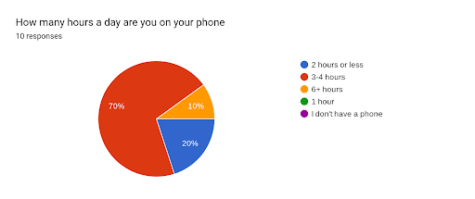What Age Should a Child Get a Phone at?

(Photo Source: Pexels.com)
October 12, 2022
You are sitting at a restaurant with your friends and you are all chatting about the newest fashion trends and enjoying each others company. All of a sudden, you glance around and see children around the ages of 6 and 8 on their tablets and their parents are just watching. Memories of family dinners that still continue to this day run through your head as you can not help but think, what has this world turned into? What happened to playing tik tac toe in a notebook and playing go fish at restaurants?
The Significance of Getting a Phone
Getting a phone is a big moment in a child’s life, and one that they will never forget. I’m sure you remember getting your phone, it was the day you were exposed to all the information that the media have to offer you. The day that you saw your friends hanging out without you. When deciding what age your child should get a phone, you have to think about the pros and cons of them having a phone. The age that your child gets a phone affects the way they see the world, and the world will never appear the same again once they get a phone. I use to really want a phone, that is until I saw what phones do to people. I remember I got my first phone going into the seventh grade at Pentucket Regional Middle School. It was an Apple iPhone XR. Although I felt lucky to have a phone, I realized that all of my friends had phones years before me.
Pros and Cons of Giving Your Child a Phone in Elementary School
When parents are giving their child their first phone, they have to consider the reasons why their child should have a phone, or why not. The reason that a parent may want to give their 5th or 6th grader a phone varies. One of the big reasons that parents give their kid a phone is because they want the ability to communicate with them. Parents need communication for when their kid is out and about, at school, and to see what time they should pick them
up from a sports practice. It is found in a study that 83% of parents give their children who are in elementary school phones in order to stay in contact with them. This shows how important it is to be able to contact your child in case of an emergency and just in general. There is another reason that parents give their children a phone at a young age, because they do not want their child to feel left out if their child’s friends have phones. It is shown in a survey that 41% of children get a phone between the ages 8-12. I remember that I really wanted a phone in the sixth grade because my brother had one, but my parents said they were just seeing how my brother, Aaron, behaved with a phone at the age. However, having a phone is not all it’s cracked up to be.

The Reality of Getting a Phone at a Young Age
Currently at the age I am now, I do not like having a phone. People do not realize how negatively a phone can impact your mental health until you buy a phone. I remember that my parents used to talk about how I should get a flip phone because I would be able to contact them through it and that is all that mattered; now I believe this to be true. The media that kids have access to on their phones these days is shocking. Social media can negatively impact someone’s mental and physical health in many different ways.

When interviewing Sophomore, Kat Valeri, and asking her if having a phone at the age of 10 affected her negatively and if it still does, she did not hesitate to explain how “I already struggle with body image as it is and social media definitely plays a huge role in making me feel more negatively about myself. I wish I got a phone when I was older because of how negatively it can make you think and crave social media. You really have to be careful when handling any sort of media app.”
Personally, I get where Valeri is coming from due to the unrealistic standards that social media has. When someone gets a phone, they do not just want it for communication purposes, but they want to Snapchat their friends, post on Instagram, make TikToks, and install all the trendy apps. Kat proves the idea that children should not get a phone at an age under 12 because of the negative mentality that phones give people.
After hearing from multiple classmates on how many hours they spend on their phones a day, I was shocked. On the survey I took, 70% of the students that took this survey are on their phones 3-4 hours a day. This is a lot considering that people need to maintain a good homework load, a family life, social life, and have a healthy mental health status. So if your going to eventually get a phone, why get one during your childhood and at the mere age of 10 or 12?
Phones Affect Children’s Relationships With Their Parents/Guardians
In most people’s earlier years of their life, they spent excessive amounts of time with their parents or siblings because everything was carefree. After school, you would go to the park, sports practice, or play a board game with your family. It seems like the older you get the more time flys and there is less time for you to spend time with your family and more time is spent on sports, homework, or procrastinating. I know that sometimes I have a lot of homework when I get home from a volleyball game and instead of starting it I will go on my phone for “just one minute” I check the clock and 30 minutes have already passed by. A lot of the time that kids make their parents wait to leave to go out is because they are distracted by something on their phone. I am so happy that I have such a strong bond with my parents and have been so close with them ever since I was little. However, I do know a lot of people who aren’t close to their parents. Those people may be on their phones in the car with their parents or listening to their own music with AirPods in just so they don’t have to communicate with their parents. Don’t get me wrong, I sometimes check my phone in the car but I genuinely enjoy spending time with my parents as well. Phones are important to have for communication, but having one at a young age makes one wonder, are they really more important than forming a strong bond with your family?

Morgan • May 21, 2024 at 12:00 pm
the name of this actical caught my attention because its a good thought to wonder about. There are pros and cons to giving a child a phone but it always depends on the way they use it. its good a kid to have a phone for an emergency but kids also use them for entertainment. days like today kids are on there phone 24/7 and the average spend time on your phone should be 2-4 hours.